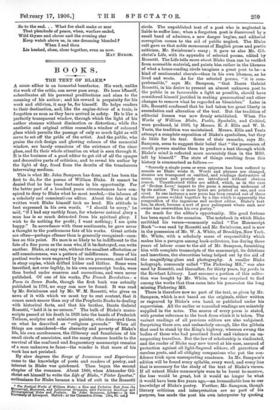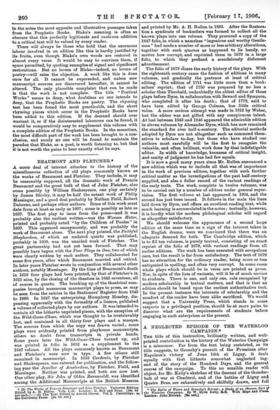BOOKS.
THE TEXT OF BLAKE.*
A Goon editor is an immortal benefactor. His work, unlike the work of the critic, can never pass away. He loses hrmself, subordinates all his personal predilections and aims to the meaning of his author; and his reward is perpetuity for his work and oblivion, it may be, for himself. He helps readers to their destination, and, like the engine-driver of a train, is forgotten as soon as they have arrived in safety. He is like a perfectly transparent window, through which the light of his author streams without diminution or distortion; while the aesthetic and original critics resemble a window of coloured glass which permits the passage of only so much light as will serve to set off the pride of the artist. And the public, who praise the rich design and glowing colours of the memorial window, are barely conscious of the existence of the clear glass, and fix their whole attention on what is seen through it. It is the business of a good editor to get rid of all the opaque and decorative parts of criticism, and to reveal his author by the light of day, freed from the deceits of the treacherous intervening medium.
This is what Mr. John Sampson has done, and has been the first to do, for the poems of William Blake. It cannot be denied that he has been fortunate in his opportunity. For the better part of a hundred years circumstances have con- spired to deny to Blake what he most needed,—the labours of a scholarly and conscientious editor. About the fate of his written work Blake himself took no heed. His attitude is best expressed in his own words. "I should be sorry," he said, "if I had any earthly fame, for whatever natural glory a man has is so much detracted from his spiritual glory. I wish to do nothing for profit; I want nothing; I am quite happy." In accordance with these sentiments, he gave never a thought to the posthumous fate of his works. Great artists are often—perhaps oftener than is generally recognised—care- less on this point. No man is so likely to be indifferent to the fate of a fine poem as the man who, if it be destroyed, can write another. Blake, at any rate, without the smallest affectation or self-consciousness, was a pattern of indifference. Some of his poetical works were engraved by his own processes, and issued in stray copies, which drifted hither and thither. Some were inscribed, not over legibly, in his own manuscript books, were then buried under erasures and corrections, and were never published. Of one of his works, The French Revolution: a Poem in Seven Books, though the first book was actually published in 1791, no copy can now be found. It was read 'by Mr. Swinburne and by Mr. W. M. Rossetti, who gives us news of it with which we must try to rest content, that it comes much nearer than any of the Prophetic Books to dealing with historical facts, and that his brother, Dante Gabriel Rossetti, "held it in no esteem." The bulk of Blake's manu- scripte passed at his death in 1828 into the hands of Frederick Tatham, sculptor and miniature painter, who destroyed them on what he described as "religious grounds." When all things are considered—the obscurity and poverty of Blake's life, his own carelessness, the illiteracy and fanaticism of his small circle of associates, and the many chances hostile to the survival of the confused and fragmentary manuscript remains of a man unknown to fame—the wonder is that more of his work has not perished.
By slow degrees the Songs of Innocence and Experience came to the knowledge of poets and readers of poetry, and interest in Blake was quickened. Then began the second chapter of the romance. About 1860, when Alexander Gil- christ set himself to write the Life of Blake, "Plato? Ignotus," enthusiasm for Blake became a kind of cult in the Rossetti * Tho Poetical Works of William Blake: a New and Verbatim Text from the Manuscript, angraved, and Letterpress Origsnais, with Variorum Readings and Bibliographicat Notes and Prefaces. By John Sampson, Librariaa in the University of liverpool. Oxford : at the Clarendon Preen. [10e, 6d. set.) circle. The unpublished text of a poet who is neglected is, liable to suffer loss; when a forgotten poet is discovered by a small band of admirers, a new danger begins, and editorial corruption comes to the aid of public neglect. The Blake cult gave us that noble monument of English prose and poetic criticism, Mr. Swinburne's essay ; it gave us also Mr. Gil- christ's Life, with its appendix of selected poems, edited by Rossetti. The Life tells more about Blake than can be verified from accessible material, and paints him rather in the likeness of what a home-reading circle imagines a great poet to be—a. kind of sentimental cherub—than in his own likeness, as he
lived and wrote. As for the selected poems, "it is com- prehensible," says Mr. Sampson, "that Dante Gabriel
Rossetti, in his desire to present an almost unknown poet to the public in as favourable a light as possible, should have considered himself justified in making grammatical and other changes to remove what he regarded as blemishes." Later in life, Rossetti confessed that he had taken too great liberty in emendation and alteration of the text. But the tradition of editorial license was now firmly established. When The Works of William Blake, Poetic, Symbolic, and Critical, were produced, in 1893, by Messrs. E. j. Ellis and W. B. Yeats, the tradition was maintained. Messrs. Ellis and Yeats attempt a complete exposition of Blake's symbolism, but they do little for his text. Some of their remarks, says Mr. Sampson, seem to suggest their belief that "the possession of occult powers enables them to produce a text through which Blake's mind is reflected more accurately than in the MSS.
left by himself." The state of things resulting from this history is summarised as follows :—
"Scarcely a single poem or even epigram has been suffered to remain as Blake wrote it. Words and phrases are changed, stanzas are transposed or omitted, and readings destructive of sense, syntax and prosody are introduced without obvious reason. Unauthorised titles are added, which, as in the case of Broken Love,' impart to the poem a meaning undreamt of by its author. Two or more lyrics are printed as one, and vice versa. In one instance a new poem has been created out of three shorter poems welded together by a line which is apparently the composition of the ingenious and modest editor. Blake's text has, in short, become a sort of poor palimpsest where each new owner has overwritten his own poetry."
So much for the editor's opportunity. His good fortune has been equal to the occasion. The notebook in which Blake scribbled his verses—commonly called "The Manuscript Book "—was used by Rossetti and Mr. Swinburne, and is now in the possession of Mr. W. A. White, of Brooklyn, New York.
Mr. White, with a scholarly sense of responsibility which makes him a paragon among book-collectors, has during three years of labour come to the aid of Mr. Sampson, furnishing him with complete transcripts of the manuscript, its deletions and insertions, the obscurities being helped out by the aid of the magnifying-glass and photography. A smaller Blake
holograph, commonly called "The Pickering MS.," was also used by Rossetti, and thereafter, for thirty years, lay perdu in the Rowfant Library. Last summer a portion of this collec- tion was bought by Mr. White, who was surprised to find among the works that thus came into his possession the long
missing Pickering MS.
There is therefore now no part of the text, as given by Mr.
Sampson, which is not based on the originals, either written or engraved by Blake's own hand, or published under his supervision. All the earlier or cancelled readings are minutely supplied in the notes. The source of every poem is stated, with precise reference to the book from which it is taken. The variant readings of all previous editors are also subjoined. Surprising these are, and melancholy enough, like the gibbets that used to stand by the King's highway, whereon swung the bodies of those who had practised fraud and violence on un- suspecting travellers. But the law of scholarship is vindicated, and the reader of Blake may now travel at his ease, assured of protection against all light-fingered editors, all garrotters of careless poets, and all obliging companions who put the con- fidence trick upon unsuspecting amateurs. In Mr. Sampson's
edition will be found every syllable, every word, and every line that is necessary for the study of the text of Blake's verses.
If all extant Blake manuscripts were to be burnt to-morrow, the loss would be great, but it would no longer be what it would have been five years ago,—an irremediable loss to OW knowledge of Blake's poetry. Further, Mr. Sampson, though literary criticism and interpretation are no part of his purpose, has made the poet his own interpreter by quoting
in the notes the most apposite and illustrative passages taken from the Prophetic Books. Blake's meaning is often so obscure that this perfectly legitimate and cautious addition to a critical text will be valued by every reader.
There will always be those who hold that the enormous labour involved in an edition like this is hardly justified by its fruits, even though Blake's own words are restored in almost every verse. It would be easy to convince them, if space permitted, by quoting examples of signal and significant restorations. But no lovers of Blake—indeed, no lovers of poetry—will raise the objection. A work like this is done once for all. It cannot be superseded, and unless new manuscript sources are discovered hereafter, it cannot be altered. The only plausible complaint that can be made is that the work is not complete. The title "Poetical Works" seems to deny, what doubtless no one intends to deny, that the Prophetic Books are poetry. The rhyming test has been found the most practicable, and the short rhyming pieces which occur in the Prophetic Books have been added to this edition. If the demand should ever warrant it, or if the disinterested labourers can be found, it would be comparatively easy to supplement this volume with a complete edition of the Prophetic Books. In the meantime, the most difficult part of the work has been brought to a con- clusion, and surely no one will be found to maintain the paradox that Blake, as a poet, is worth listening to, but that it is not worth the pains to hear exactly what he says.











































 Previous page
Previous page